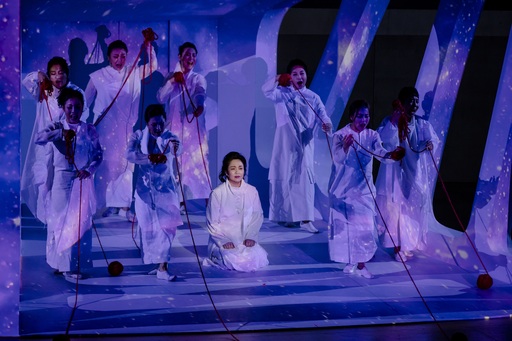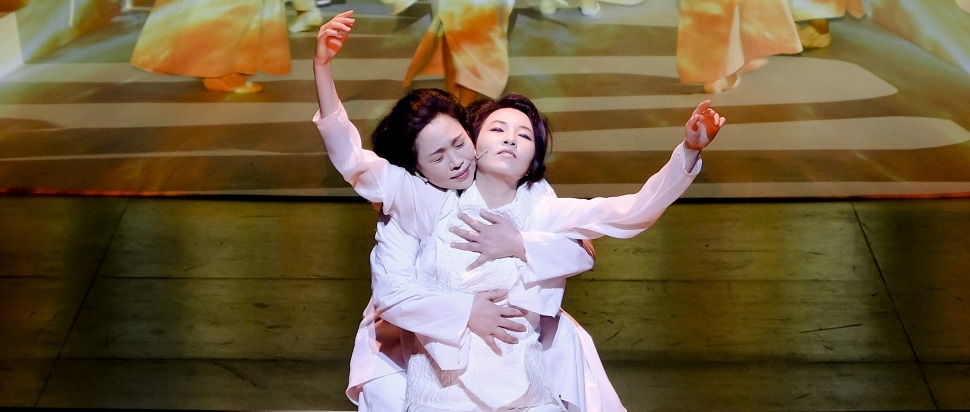Psychic Translations: Ong Ken Sen on Trojan Women at EIF
Director Ong Ken Sen sought emotional resonances across Euripides' Trojan Women and the story of the Korean Comfort Women
In the final days of 2015, Japan and South Korea reached a landmark agreement about the recognition of Comfort Women, promising 1 billion yen (5.6 million pounds) in reparations. The euphemistically named Comfort Women were abducted from their homes in Korea (and China) under Japanese occupation during the Second World War and forced into sex slavery by the Japanese military. Such an acknowledgement by the Japanese government has been decades in the making – however, just weeks after his government reached an agreement, the then-Prime Minister of Japan, Shinzo Abe, publicly denied any evidence that these women were taken without their consent.
No one seemed all that surprised. The government of Japan had persistently taken a hard line on insisting that the Comfort Women came along willingly – that they were sex workers, sluts, and degenerates who deserved what happened to them (as if, because of who the Japanese government claimed they were, their consent was implicit). A vanishingly small population of these women are still alive, and with each year, foregrounding their story becomes ever more critical.
Ancient Resonances
Singaporean director Ong Ken Sen says that he was drawn to the struggle of the Comfort Women against a government superpower. Ong's long-time project, a Korean-language production of Euripides' Trojan Women, will run at Festival Theatre this August as part of the Edinburgh International Festival. Connecting the Korean Comfort Women to the story of Trojan Women, he says: "There's a struggle like in Trojan Women against an oppressive reality. Now they have no more voice. They have no country. They have nothing except their individual bodies, their individual memories, their individual traumas, their individual experiences."
Throughout his long and illustrious career, Ong has dedicated his energy to highlighting resonances of oppression across borders. He was particularly moved, he said, by the conflict over a bronze statue of a metonymic Comfort Woman, positioned facing the Japanese Embassy in Seoul. This Statue of Peace has become the physical manifestation of the ongoing conflict. While some factions seek her removal, others adorn her with clothes and goods to keep her warm. In 2015, the Japanese government even went as far as to threaten to withhold their reparations until the statue was removed. Ong recounts being in the final month of rehearsals for Trojan Women while Korean university students were organising to protect the statue from defacement or removal. Passing the statue and demonstration every day on his way to work, Ong says that it evoked the critical question: "How do you forgive, but not forget?"
The story of the Comfort Women isn't overtly present in Trojan Women. Rather, Ong says, "there's some kind of density of material, some kind of hovering memory… It is still Trojan Women, but it's a way of layering the work. We don't express it overtly." These resonances act as an "entry point, a portal, for the performance." Trojan Women crosses borders in more ways than one. It uses a reference point that may not be as familiar to viewers from the West, but that doesn't mean it isn't a familiar story.
Ong says that the text of Trojan Women was initially distant for the performers. But as they rehearsed, he says, "It just tapped into some kind of cultural vein – the stories of mothers and daughters and aunts and granddaughters and grandmothers. They say that Korean culture is held by the spine of women, that the women are the ones who hold the entire community together. And so it was a bit like I harnessed it to tap into some kind of emotional space that was initially not rationally present, but it was instinctive. And then it grew and grew, and for these women it finally became their stories."
The right to "own" one's story comes up particularly strongly in survivor narratives. In Trojan Women, the female survivors of the Trojan War are captured and subjected to sex slavery – body and narrative intertwine to construct agency, or lack thereof. The story encodes memory as something tangible and real. Violence is enacted and repeated first by assault, and then by the routine, structural effacement of emotional memory by oppressors.
Multi-Disciplinary Collaboration
The parallels between this story and the ongoing struggle of the Korean Comfort Women are all too evident. This connection is made multi-dimensional by Ong's collaborations with music director and composer Jung Jae-Il and pansori composer Ahn Sook-Sun. In addition to a soundtrack inspired by K-Pop, Trojan Women incorporates the traditional Korean art of pansori. Pansori is an ancestral Korean art form in which one (female) vocalist performs with one instrumentalist. The vocal style is raw and highly demanding, and the performances can last hours. There are only a handful of professional pansori singers remaining, including Ahn, who was named an Intangible Cultural Heritage holder last year. "Every time she sings," Ong says, "it's like gold dropping from her mouth." The performers in Trojan Women learned the pansori lines by listening to recordings of Ahn, and her creative voice is prevalent throughout the piece. The show is punctuated by this deeply treasured and unique art form. It seems like a perfect fit for the story of the Trojan Women to be told through an art form that depends on women to preserve and perpetuate oral memory.

Trojan Women, Edinburgh International Festival. Credit: National Theatre of Korea
At the very least, Edinburgh festival audiences can expect to see a rare art form performed at the highest level. But Ong hopes that the impact of the production will be farther-reaching. He was attracted, he says, to pansori because of its locus in the working classes. Ong says that, in the earliest days of pansori, performers travelled the Korean countryside, singing their stories. What interested Ong was the interplay between myth and reality – pansori preserves and embodies myth, while it is simultaneously a living art form. Pansori, like classical Greek theatre, chronicles history and reflects culture. "War is perennial," Ong says, "and we are still struggling with this reality daily. The idea that this is passed on from something that happened to Homer, and then Homer to Euripides… and then, finally, all the way to Edinburgh, with these Korean women. These stories are eternal, and they are kept alive by the storytellers."
Ong refers to a "psychic translation" between the many languages and histories of the piece. "When I'm invited to work with traditions, I try to find something which is more like an archetype or lodestone. There is some power of a kind of lodestone, or a kind of something that unlocks everything, and suddenly you understand as you've never understood before.
"We are so entrapped by the realities," Ong says, "and then we cannot get into a dream space, or a space of nightmare." He stresses the function of distance: "Trojan Women was, in a way, a vacuum in which a lot of emotions could then be explored without it [falling] into certain fault lines…Sometimes I feel like we don't have enough distance to then reimagine or to reconfigure the imaginary so that we attract insight." Talking of the difficulty of making documentary theatre about contemporary conflict, Ong says, "It's so concrete. So we just fall into these fault lines and these knee-jerks." Exploring Korean traumas through the text of Trojan Women "allowed a lot of these fears to be kept at a distance." It isn't that the grim realities of conquest and sexual violence are held at arms' length by the production – rather, these parallel flashpoints are connected on a deeper resonance. They are held in the nebulous space of cultural recollection.
War, Ong continues, is gendered. Sexual violence is an essential tool of subjugation. The strongest (and often the only) recourse survivors have is the expression of memory. In Euripides' time and now, hegemonic powers rule by enforcing silence. They deny and discredit; they cast doubt on embodied narrative. But memory has deep roots – by giving voice to ancient women, Ong proves that oral tradition is more resilient than any regime.
Trojan Women, Festival Theatre, Edinburgh, 9-11 Aug, 7.30pm
